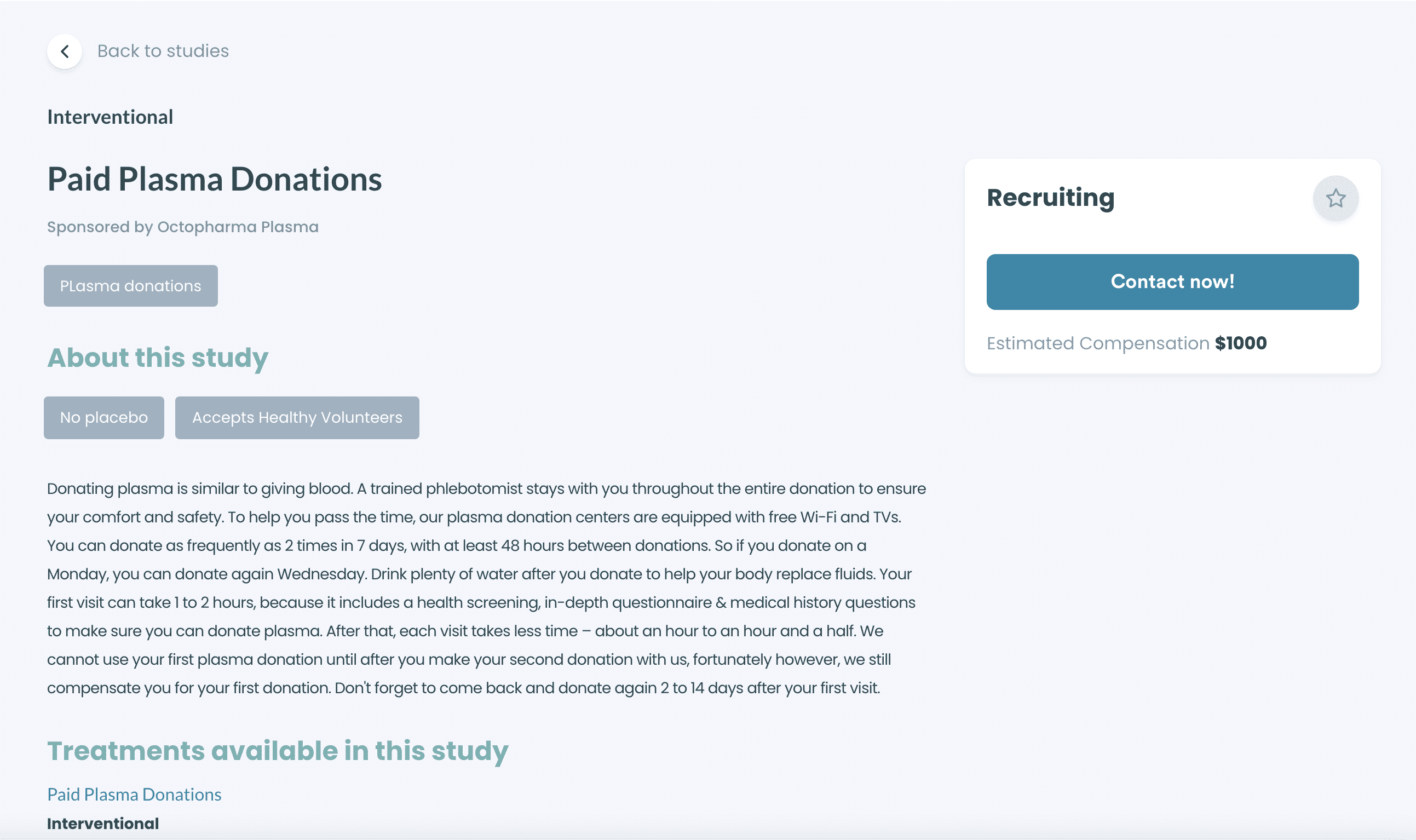Can Diabetics Donate Plasma?
People with diabetes usually have higher blood sugar levels and use oral diabetes medications or insulin injections to balance them. But can being a Some reasons to donate plasma could be to:
| Earn money | You can earn a hefty amount of money by donating plasma. If you're opting to donate plasma for cash, you can earn around $1,000 each month. |
| Make an impact | Plasma donation is, undoubtedly, a great way to make an impact. Thus, helping you to improve the quality of someone's life. |
| Boost your mood | Recent studies suggest that donating something directly boosts your mood. By donating plasma for money, you can reduce your stress level. |
| Eat better | Being a plasma donor helps you to improve your diet. You will be educated to cut down on fatty foods and limit other unhealthy food. |
| Be healthier | Donating plasma will help you lower the cholesterol levels in your body. |
According to the National Institutes of Health, diabetics can also participate in the plasma donation process without hindering their ability to save a life. However, the study adds that the diabetic condition should be under control, and the donor must be well.
So, can people with diabetes donate plasma, and how can DoNotPay help? Read on to find out more.
What Is Plasma?
Before we dive into whether people with diabetes can donate plasma, let's first discuss what plasma is. When many people think of blood, the immediate things that come to their minds are blood cells and the nutrients they transport.
However, plasma also plays a key role by carrying essential blood components throughout your body. It is the largest blood component and makes up about 55% of its overall content. On its own, plasma is this light-yellow liquid that carries water, salts, and enzymes throughout your body.
Plasma's main role is to transport nutrients, proteins, and hormones to different parts of the body and remove waste from cells from your system.
Plasma donors need to be in good health to donate. if this is the case?
Can Diabetics Donate Plasma?
According to the CDC, being a diabetic shouldn't prevent you from donating plasma. People with type 1 diabetes make very little to no insulin, the compound used to regulate sugar in your blood. Therefore, these people must rely entirely on insulin injections and other medications to control their blood sugar.
On the other hand, type 2 diabetics are insulin resistant and rely on outside sources like medication to control their blood sugars. In both types of diabetes, how you manage your condition will determine whether you'll be eligible for plasma donation for money.
So what is the process for donating plasma? Anyone with diabetes who wants to donate plasma must monitor their blood sugar levels before the donation process to ensure they fall within the plasma donation requirements.
Factors That May Prevent Diabetics from Donating
As much as you may be willing to donate plasma as a person with diabetes, you might not meet the acceptable donation requirements. Some factors that may prevent you from donating plasma as a diabetic include:
1. Blood Sugar Levels
Plasma donation centers will always monitor your blood sugar levels and only allow you to donate if your blood sugar level is within the target range set by the medical provider. You must also be in good health.
However, if you're having issues with your blood sugar level and are not in the minimum required range, you might not be eligible for donation. You must also let your doctor know that you want to donate plasma and get their recommendation.
2. Source of Insulin
Interested donors who have used the bovine-derived insulin any time after 1980 are also ineligible to donate plasma. These people cannot donate plasma because of concerns about the mad cow disease or variant CJD. Some studies have shown that there are chances mad cow disease can be transmittable through blood transfusions.
However, taking other diabetic medications shouldn't prevent you from donating blood or plasma. But still, there's a list of some medicines that may disqualify you from donating. That's why it is important to check with your doctor and get their recommendation before proceeding with the process.
Can Diabetics Donate Plasma? Find Out With the Help of DoNotPay
Unfortunately, there's much more to plasma donation than many realize. For instance, there are the following to consider:
- How often can you donate plasma
- How old do you have to be to donate plasma
- Can you donate plasma after the COVID-19 vaccine
- How long does it take to donate plasma
Plasma donation is a sensitive topic, especially for people with diabetes.
That's why you need a guiding hand to help you through the entire process. DoNotPay provides you with the help you need with your plasma donation process. You can use the DoNotPay app to determine if your diabetic condition allows or disqualifies you from donating plasma.
If you want to check if you can donate plasma successfully with DoNotPay, simply follow these steps:
- Search "plasma donations" on DoNotPay and find the nearest donation clinic through our clinical trials product.

- Select the "Contact Now" button to learn more about eligibility criteria, contact the clinic with questions, or sign up for first-time donor bonuses.

- Verify your information and submit your inquiry! DoNotPay will contact the clinic on your behalf and make sure your questions get answered.

As you can see, DoNotPay makes the process simpler and quicker than most services.
Why Use DoNotPay to Know if You Can Donate Plasma
Besides guaranteeing you the right results within the shortest time, there are many other great reasons to use the DoNotPay app. DoNotPay is:
- Fast: You don't have to spend too long trying to get in contact with a representative at a plasma donation center.
- Easy: You won't have to spend time searching online to find an answer to your problem or finding a location to donate.
- Succesful: Hundreds of clients have successfully used the service to check their plasma donation status with the DoNotPay app.
What Else Can DoNotPay Do?
DoNotPay does so much more than just notify you if you can donate plasma if you have diabetes. You can also use the service to solve many other life issues, including:
- Creating an advance healthcare directive
- Filing insurance claims
- Searching for Clinical trials
- Requesting for sick leave
As you can see, DoNotPay provides you with a faster, easier, and more successful way of determining whether your diabetic condition qualifies you for plasma donation or not. Try DoNotPay today to learn more about our services!
 By
By